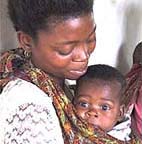|
||||

|
|
|||||
|
March 2001 Return to March 2001 contents page THE IDEA EXCHANGE Equity is the key to our policy Tore Godal responds
We have learnt some lessons. Despite the spectacular gains in routine immunization coverage with the basic six vaccines in the 1980s, progress was not maintained in the 1990s and, by the end of the last decade, one in four children was still not receiving those six vaccines routinely. Business as usual did not seem to be enough; new incentives were needed if coverage was to increase. GAVI is trying to create such incentives, both for strengthening existing services and for the introduction of new and under-used vaccines. Catriona Waddington raises concerns about National Immunization Days. As far as this relates to GAVI policy, let me be clear: the Alliance is first and foremost about strengthening routine services. The positive side of NIDs is that they can, and do, reach out to virtually all children(1). To our knowledge, they are the only approach that achieves this. If we are serious about equity, we must support governments' use of immunization days as a means to reach the unreached, but only for this purpose, and as a complement to a good routine service. We know that NIDs can have negative effects on the routine service. They must be planned as a regular programme – in effect, they can be incorporated into the routine system. Disruption to the rest of the system can, I believe, be reduced if, where appropriate, immunization days are conducted at regional level rather than nationally. Recent analyses have suggested that a planned programme of immunization days can actually help to strengthen a health system(2). Equity is also at the heart of GAVI's push to give more children access to new and under-used vaccines such as hepatitis B and Hib. Many middle-income countries are using these vaccines now, but they are still strikingly absent from the poorest countries. There are of course real questions about how such countries can sustain the resources to buy these vaccines. Realistically, the poorest countries are going to need international support for their immunization programmes until they move out of the poorest bracket, and that is why the Alliance is working hard to find mechanisms by which such support can be sustained beyond the five years we're committed to. The vaccines are more expensive per dose than the traditional six vaccines, but they are cost-effective in terms of their cost per healthy year of life gained. And, in terms of their cost per capita, they can be justified even where public spending on health is below $10 per person per year. But we know that even routine immunization with the basic six vaccines is not maintained in the poorest countries if international support falls away. So all of us recognize that the international community has a duty to maintain its support, while governments have a responsibility to convince donors of the case for doing so. Dr Tore Godal is Executive Secretary of GAVI. References (1) Immunize Every Child. Gavi Strategy for Sustainable Immunization Services. http://www.vaccinealliance.org/reference/immunize.html (2) Disease eradication: friend or foe to the health system? http://www.who.int/vaccines-documents/DocsPDF00/www552.pdf
Return to March 2001 contents page
|
|||||
| Contact GAVI | Guestbook | Text version | Credits and Copyright
|
|||||
